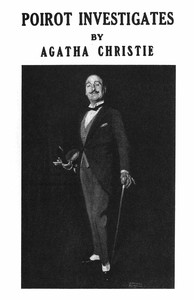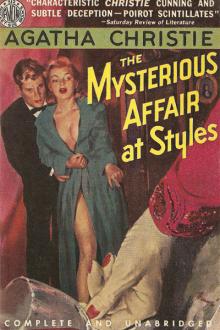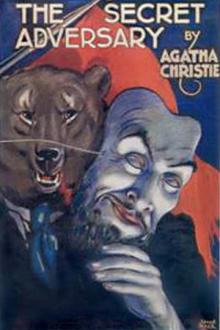Poirot Investigates by Agatha Christie (10 ebook reader .TXT) 📗

- Author: Agatha Christie
Book online «Poirot Investigates by Agatha Christie (10 ebook reader .TXT) 📗». Author Agatha Christie
“You are Hassan, the late Sir John Willard’s servant?”
“I served my Lord Sir John, now I serve his son.” He took a step nearer to us and lowered his voice. “You are a wise one, they say, learned in dealing with evil spirits. Let the young master depart from here. There is evil in the air around us.”
And with an abrupt gesture, not waiting for a reply, he strode away.
“Evil in the air,” muttered Poirot. “Yes, I feel it.”
Our meal was hardly a cheerful one. The floor was left to Dr. Tosswill, who discoursed at length upon Egyptian antiquities. Just as we were preparing to retire to rest, Sir Guy caught Poirot by the arm and pointed. A shadowy figure was moving amidst the tents. It was no human one: I recognized distinctly the dog-headed figure I had seen carved on the walls of the tomb.
My blood literally froze at the sight.
“Mon Dieu!” murmured Poirot, crossing himself vigorously. “Anubis, the jackal-headed, the god of departing souls.”
“Some one is hoaxing us,” cried Dr. Tosswill, rising indignantly to his feet.
“It went into your tent, Harper,” muttered Sir Guy, his face dreadfully pale.
“No,” said Poirot, shaking his head, “into that of the Dr. Ames.”
The doctor stared at him incredulously; then, repeating Dr. Tosswill’s words, he cried:
“Some one is hoaxing us. Come, we’ll soon catch the fellow.”
He dashed energetically in pursuit of the shadowy apparition. I followed him, but, search as we would, we could find no trace of any living soul having passed that way. We returned, somewhat disturbed in mind, to find Poirot taking energetic measures, in his own way, to ensure his personal safety. He was busily surrounding our tent with various diagrams and inscriptions which he was drawing in the sand. I recognized the five-pointed star or Pentagon many times repeated. As was his wont, Poirot was at the same time delivering an impromptu lecture on witchcraft and magic in general, White Magic as opposed to Black, with various references to the Ka and the Book of the Dead thrown in.
It appeared to excite the liveliest contempt in Dr. Tosswill, who drew me aside, literally snorting with rage.
“Balderdash, sir,” he exclaimed angrily. “Pure balderdash. The man’s an impostor. He doesn’t know the difference between the superstitions of the Middle Ages and the beliefs of Ancient Egypt. Never have I heard such a hotch-potch of ignorance and credulity.”
I calmed the excited expert, and joined Poirot in the tent. My little friend was beaming cheerfully.
“We can now sleep in peace,” he declared happily. “And I can do with some sleep. My head, it aches abominably. Ah, for a good tisane!”
As though in answer to prayer, the flap of the tent was lifted and Hassan appeared, bearing a steaming cup which he offered to Poirot. It proved to be camomile tea, a beverage of which he is inordinately fond. Having thanked Hassan and refused his offer of another cup for myself, we were left alone once more. I stood at the door of the tent some time after undressing, looking out over the desert.
“A wonderful place,” I said aloud, “and a wonderful work. I can feel the fascination. This desert life, this probing into the heart of a vanished civilization. Surely, Poirot, you, too, must feel the charm?”
I got no answer, and I turned, a little annoyed. My annoyance was quickly changed to concern. Poirot was lying back across the rude couch, his face horribly convulsed. Beside him was the empty cup. I rushed to his side, then dashed out and across the camp to Dr. Ames’s tent.
“Dr. Ames!” I cried. “Come at once.”
“What’s the matter?” said the doctor, appearing in pyjamas.
“My friend. He’s ill. Dying. The camomile tea. Don’t let Hassan leave the camp.”
Like a flash the doctor ran to our tent. Poirot was lying as I left him.
“Extraordinary,” cried Ames. “Looks like a seizure—or—what did you say about something he drank?” He picked up the empty cup.
“Only I did not drink it!” said a placid voice.
We turned in amazement. Poirot was sitting up on the bed. He was smiling.
“No,” he said gently. “I did not drink it. While my good friend Hastings was apostrophizing the night, I took the opportunity of pouring it, not down my throat, but into a little bottle. That little bottle will go to the analytical chemist. No”—as the doctor made a sudden movement—“as a sensible man, you will understand that violence will be of no avail. During Hastings’ brief absence to fetch you, I have had time to put the bottle in safe keeping. Ah, quick, Hastings, hold him!”
I misunderstood Poirot’s anxiety. Eager to save my friend, I flung myself in front of him. But the doctor’s swift movement had another meaning. His hand went to his mouth, a smell of bitter almonds filled the air, and he swayed forward and fell.
“Another victim,” said Poirot gravely, “but the last. Perhaps it is the best way. He has three deaths on his head.”
“Dr. Ames?” I cried, stupefied. “But I thought you believed in some occult influence?”
“You misunderstood me, Hastings. What I meant was that I believe in the terrific force of superstition. Once get it firmly established that a series of deaths are supernatural, and you might almost stab a man in broad daylight, and it would still be put down to the curse, so strongly is the instinct of the supernatural implanted in the human race. I suspected from the first that a man was taking advantage of that instinct. The idea came to him, I imagine, with the death of Sir John Willard. A fury of superstition arose at once. As far as I could see, nobody could derive any particular profit from Sir John’s death. Mr. Bleibner was a different case. He was a man of great wealth. The information I received from New York contained several suggestive points. To begin with, young Bleibner was reported to have said he had a good friend in Egypt from whom he could borrow. It was tacitly understood that he meant his uncle, but it seemed to me that in that case he would have said so outright. The words suggest some boon companion of his own. Another thing, he scraped up enough money to take him to Egypt, his uncle refused outright to advance him a penny, yet he was able to pay the return passage to New York. Some one must have lent him the money.”
“All that was very thin,” I objected.
“But there was more. Hastings, there occur often enough words spoken metaphorically which are taken literally. The opposite can happen too. In this case, words which were meant literally were taken metaphorically. Young Bleibner wrote plainly enough: ‘I am a leper,’ but nobody realized that he shot himself because he believed that he had contracted the dread disease of leprosy.”
“What?” I ejaculated.
“It was the clever invention of a diabolical mind. Young Bleibner was suffering from some minor skin trouble, he had lived in the South Sea Islands, where the disease is common enough. Ames was a former friend of his, and a well-known medical man, he would never dream of doubting his word. When I arrived here, my suspicions were divided between Harper and Dr. Ames, but I soon realized that only the doctor could have perpetrated and concealed the crimes, and I learnt from Harper that he was previously acquainted with young Bleibner. Doubtless the latter at some time or another had made a will or had insured his life in favour of the doctor. The latter saw his chance of acquiring wealth. It was easy for him to inoculate Mr. Bleibner with the deadly germs. Then the nephew, overcome with despair at the dread news his friend had conveyed to him, shot himself. Mr. Bleibner, whatever his intentions, had made no will. His fortune would pass to his nephew and from him to the doctor.”
“And Mr. Schneider?”
“We cannot be sure. He knew young Bleibner too, remember, and may have suspected something, or, again, the doctor may have thought that a further death motiveless and purposeless would strengthen the coils of superstition. Furthermore, I will tell you an interesting psychological fact, Hastings. A murderer has always a strong desire to repeat his successful crime, the performance of it grows upon him. Hence my fears for young Willard. The figure of Anubis you saw to-night was Hassan, dressed up by my orders. I wanted to see if I could frighten the doctor. But it would take more than the supernatural to frighten him. I could see that he was not entirely taken in by my pretences of belief in the occult. The little comedy I played for him did not deceive him. I suspected that he would endeavour to make me the next victim. Ah, but in spite of la mer maudite, the heat abominable, and the annoyances of the sand, the little grey cells still functioned!”
Poirot proved to be perfectly right in his premises. Young Bleibner, some years ago, in a fit of drunken merriment, had made a jocular will, leaving “my cigarette case you admire so much and everything else of which I die possessed which will be principally debts to my good friend Robert Ames who once saved my life from drowning.”
The case was hushed up as far as possible, and, to this day, people talk of the remarkable series of deaths in connection with the Tomb of Men-her-Ra as a triumphal proof of the vengeance of a bygone king upon the desecrators of his tomb—a belief which, as Poirot pointed out to me, is contrary to all Egyptian belief and thought.
VII“Poirot,” I said, “a change of air would do you good.”
“You think so, mon ami?”
“I am sure of it.”
“Eh—eh?” said my friend, smiling. “It is all arranged, then?”
“You will come?”
“Where do you propose to take me?”
“Brighton. As a matter of fact, a friend of mine in the City put me on to a very good thing, and—well, I have money to burn, as the saying goes. I think a week-end at the Grand Metropolitan would do us all the good in the world.”
“Thank you, I accept most gratefully. You have the good heart to think of an old man. And the good heart, it is in the end worth all the little grey cells. Yes, yes, I who speak to you am in danger of forgetting that sometimes.”
I did not quite relish the implication. I fancy that Poirot is sometimes a little inclined to underestimate my mental capacities. But his pleasure was so evident that I put my slight annoyance aside.
“Then, that’s all right,” I said hastily.
Saturday evening saw us dining at the Grand Metropolitan in the midst of a gay throng. All the world and his wife seemed to be at Brighton. The dresses were marvellous, and the jewels—worn sometimes with more love of display than good taste—were something magnificent.
“Hein, it is a sight this!” murmured Poirot. “This is the home of the Profiteer, is it not so, Hastings?”
“Supposed to be,” I replied. “But we’ll hope they aren’t all tarred with the Profiteering brush.”
Poirot gazed round him placidly.
“The sight of so many jewels makes me wish I had turned my brains to crime, instead of to its detection. What a magnificent opportunity for some thief of distinction! Regard, Hastings, that stout woman by the pillar. She is, as you would say, plastered with gems.”
I followed his eyes.
“Why,” I exclaimed, “it’s Mrs. Opalsen.”
“You know her?”
“Slightly. Her husband is a rich stockbroker who made a fortune in the recent Oil boom.”
After dinner we ran across the Opalsens in the lounge, and I introduced Poirot to them. We chatted for a few minutes, and ended by having our coffee together.
Poirot said a few words in praise of some of the costlier gems displayed on the lady’s ample bosom, and she brightened up at once.
“It’s a perfect hobby of mine, Mr. Poirot. I just love jewellery. Ed knows my weakness, and every time things go well he brings me something new. You are interested in precious stones?”
“I have had a good deal to do with them one time and another, madame. My profession has brought me into contact with some of the most famous jewels in the world.”
He went on to narrate, with discreet pseudonyms, the story of the historic jewels of a reigning house, and Mrs. Opalsen listened with bated breath.
“There now!” she exclaimed, as he ended. “If it isn’t just like a play! You know, I’ve got some pearls of my own that have a history attached to them. I believe it’s supposed to be one of the finest necklaces in the world—the pearls are so beautifully matched and so perfect in colour. I declare I really must run up and get it!”
“Oh, madame,” protested Poirot, “you are too amiable. Pray do not derange yourself!”
“Oh, but I’d like to show it to you.”
The buxom dame waddled across to the lift briskly enough. Her husband, who had been talking to me, looked at Poirot inquiringly.
“Madame your wife





Comments (0)